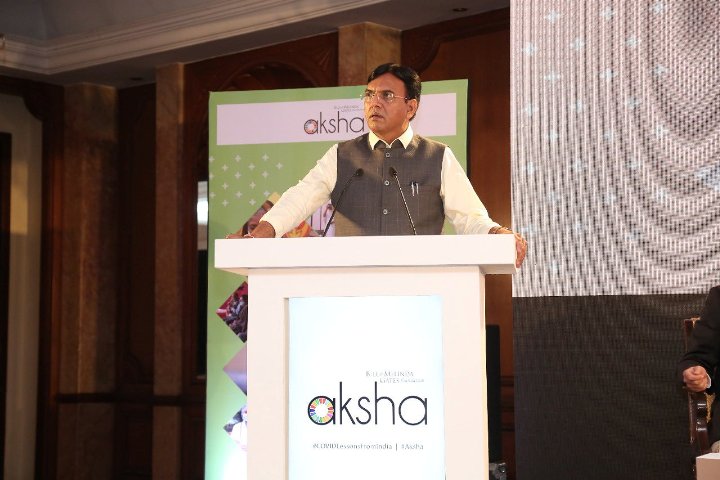Jan Andolan and Jan Bhagidari key pillars of India’s COVID management strategy: Dr. Mandaviya
The Union Minister highlighted that “India presented an exemplary model of COVID management with Centre and States working in unison in a federal democracy.

- Country:
- India
“India’s COVID management is a story of leadership, innovation, dedication, partnership, sharing and leveraging technology”. This was stated by Dr Mansukh Mandaviya, Union Minister for Health and Family Welfare as he delivered the keynote address at “Aksha’ – Lessons from India”, an event organized by Bill & Melinda Gates Foundation (BMGF), here today. Country Heads and Representatives from Development Partners such as WHO, UNICEF, UNDP, USAID, ADB, and BMGF were present at the meet.
The event was organized to take key lessons and share experiences and best practices from India’s COVID management and vaccination journey.
The Union Minister highlighted that “India presented an exemplary model of COVID management with Centre and States working in unison in a federal democracy. Jan Andolan and Jan Bhagidari are key pillars of India’s COVID management strategy”. Dr. Mandaviya reminded the audience that several studies had made ill-informed predictions and assumptions on the impact of the pandemic in India but “India’s political leadership took decisive actions at crucial times in a strategic manner by learning from and amalgamating best global practices with our own approach to manage the pandemic”.
Appreciating the contribution of healthcare workers in the fight against the Covid-19 pandemic, Dr Mandaviya applauded their motivation and dedication. In this context, the Minister also highlighted the innovative ways in which the Prime Minister encouraged them to contribute their best.
On the government’s efforts in controlling the Covid-19 pandemic, Dr Mandaviya said, that it was a “joint effort by multitude stakeholders like NGOs, CSOs, industry, development partners”. Administration of more than 181 Cr has contributed to our success in management of third surge, he added. He underscored the fact that “despite the huge diversity of geographies and population, India demonstrated how a huge vaccination drive can be mounted at scale”.
Dr Mandaviya also stated that in keeping with Indian ethos and tradition, the country supplied COVID19 vaccines with the world “even before our own vaccine requirement was fully met.” He also added that “we did not exhibit any arrogant behaviour but shared what India produced. We have provided medicines such as HCQ to many countries. We did not compromise on quality or bargain with the price.”
The Union Minister further said that “India’s success story presents takeaway for other countries to emulate, just as we are always open to learning from global best practices.”
Shri Rajesh Bhushan, Union Health Secretary, noted that the Union government acted on a proactive mode since the onset of the pandemic to address the various challenges of vaccine roll-out across the country, vaccine production as well as vaccine hesitancy among the people. He highlighted that India has already covered 96% of India’s 15+ population with the first dose of the COVID19 vaccine.
Dr. Balram Bhargava, DG, ICMR, noted that India has made a mark in the world in terms of vaccine production and vaccine delivery. He also added that “a great journey lies ahead for India to make new discoveries in the world for other diseases”.
Through a presentation, Shri Lav Agarwal, Joint Secretary, Health Ministry, pointed out that India undertook a scientific approach for management of COVID19. He highlighted that a whole of the government approach, robust communication strategies, effective use of digital and technological tools and a mammoth effort on the part of grassroots health workers helped India in going to the last mile towards vaccinating its people.
Dr. Rodrigo Ofrin, Country Director, WHO outlined the sheer number of people, vaccination centres, cold chains and other associated networks employed in the mammoth vaccination exercise across India. He praised the country’s vaccine manufacturing capability, stating that “India is already a vaccine superpower in the world as over 70% vaccines for various antigens in the world are manufactured in India”.
Ms. Shoko Noda, UNDP Resident Representative said that India’s COVID19 vaccination drive is “unparalleled” across the world. She further said that India’s vaccination success story is a reflection of the commitment and dynamism displayed by the leadership of the country towards meeting the challenge of the pandemic.
Mr. Yasumasa Kimura, Deputy UNICEF India Representative congratulated India for the world’s largest vaccination drive. He said that India’s vaccination model has been very important in defining the global trajectory of the COVID19 pandemic.
Ms Anjali Kaur, Deputy Assistant Administrator for Asia, USAID underlined that India’s mammoth vaccination exercise served as a model for other countries. She further stated that India’s vaccination journey showed that power inclusion is crucial in proper distribution of vaccines.
Mr. Takeo Konishi, Country Director, Asian Development Bank noted that despite huge geographical, cultural and political challenges, India has demonstrated a roadmap to the world on overcoming numerous challenges. He congratulated India on its multi-strategy focussed response to the pandemic by galvanising governments, community participation
Dr. Chris Elias, President, BMGF appreciated “India’s remarkable achievements and incredible efforts towards managing the COVID19 pandemic”. He asserted that "Innovation is a regulatory decision to balance speed with safety with respect to vaccines, which India has taken promptly and proactively. It has developed CoWIN as a public good, which can be used elsewhere also to increase the delivery pace of vaccines”.
(With Inputs from PIB)
- READ MORE ON:
- ICMR
- Bill & Melinda Gates Foundation
- Yasumasa Kimura
- UNICEF
- Rajesh Bhushan










